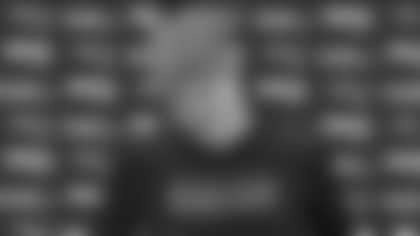BB: We're obviously looking forward to today, working with Sean [Payton] and the Saints. It's a really good organization, good program. They do a really good job in a lot of areas, so this will be great competition for us. This is the fourth time with the Saints so we feel confident about the relationship that we have with them and expect it to be a very productive day for us. Like I said, the big thing for us is just trying to get better, trying to work at what we need to work against and work on against a quality organization, a quality team, a lot of good players, a very experienced coaching staff. I just think they do a real good job.
Q: Did you have the referees in here this morning?
BB: Yeah, they are here.
Q: What stood out in their presentation to you and your team?
BB: We haven't had a presentation. They'll be here at practice.
Q: A lot of times you see teams get together for joint practices and not mesh well. Why have you had such success in working with the Saints?
BB: I don't know. You'd have to talk to the other teams about the other teams. I don't know. We have a great relationship with the Saints and with Sean. Like I said, it's our fourth time doing it. We've really never had any problems.
Q: What kind of things can you learn about your players when they are practicing against a different opponent?
BB: Well, we'll see. It's definitely a different scheme, different matchups, different players. We've worked against each other, we kind of know each other, so we're in a whole different environment now. We'll see what happens.
Q: Is it beneficial that you can control the situations here when you are practicing against another team as opposed to not knowing what to expect in a game situation?
BB: It's no different than our regular practice. We control our practices and so the coaching staffs have agreed to "This is what we want to do, or there are a couple of things we don't want to do." So, that's what it is.
Q: How do you plan to handle the repetitions at quarterback for the preseason games?
BB: I told you before what the situation is and it hasn't changed.
Q: What have you seen at the linebacker position from Kamu Grugier-Hill?
BB: [He's] a young player, has got a lot to learn. [He's] working hard every day, getting better, [but] a long way to go.
Q: What are you hoping to see from Donald Brown over these joint practices and potentially during the first preseason game that will help him separate himself at the running back position?
BB: Look, I can't control what any player does. If the player gets an opportunity, then whatever he gets he earns. It's up to each individual player to go out there and compete against whoever he is competing against, and that will be relative to the other players that he's in competition with at his position, or in relevant positions for playing time and for roster positions. It's the same for everybody. I don't have any feelings towards one player over or another in any of these situations. We give them the opportunity. It's up to them. I root for all of them but I can't control how they perform.
Q: Do you feel like Tyler Gaffney has made the most of the opportunities he has received thus far in camp, and how much can you really evaluate the running back position when you aren't in a game situation?
BB: Well, more than you can see in the spring, but less than you can see in games, so we're somewhere in the middle there. That's a big part of that position, is being able to see holes, make yards after contact and so forth. We see what we can see, and it's certainly more than we saw in the spring, but it'll be less than what we'll see in a game. But no, you're right, Tyler has gotten some opportunity. We didn't see anything his first year. Last year it was limited. This year it has already far exceeded that, so we'll just see where it goes.
Q: What improvements have you seen from Jon Halapio since the last time he was here with your team?
BB: He's lighter, he's in better condition, and he has a little more experience, a couple more years of experience, so that's definitely to his benefit. He just has a little more confidence, awareness, but he's worked hard physically. You can see that just by his general appearance, so I think he's moving in the right direction. He has made progress.
Q: What have you seen from former Saints' players Ramon Humber and Vinnie Sunseri?
BB: [They've been] good. They've both done a good job for us. Vinnie, we didn't get until the start of training camp. Ramon has been here all year. They're both durable, dependable, been out there every day, working hard to get better, making steady improvement, very competitive. I'm glad we have them.
Q: What did you like about Markus Kuhn when you decided to bring him in and how is his skillset different than the other defensive lineman on the team?
BB: Markus is a young player in terms of experience. He's a little older [in age] because of his situation, but a young player that's still getting better, works hard, smart, a good, tough kid. He has good playing strength. He played well for the Giants. We played against him last year and evaluated him prior to our game and also in our game. He's very competitive out there with that group. Again, relative to the contact at the running back position, the contact certainly in terms of the offensive and defensive lines is something we've seen a lot more in training camp, but it's a little bit different in the game so we'll see how that goes for everybody.
Q: How would you characterize the compete-level in the secondary and in particular what you have seen from E.J. Biggers in camp?
BB: E.J. is an experienced player. He has some position versatility, so he's done some different things for us. Our secondary has competed well in camp. I think our receivers have competed well, but we'll find out more this week. These guys [Saints] throw the ball as well as any team in the league. They consistently lead the league in passing, great quarterback, great skill receivers, obviously well coached, a good scheme, so this will be great work for us against these guys. [Coby] Fleener – a tough guy to cover at tight end, we know that. Plus, they have [Brandin] Cooks. It doesn't get much better than him. [Drew] Brees – so we'll be working against a lot of great players and a great offense and a great passing game. This will be excellent work for our secondary and our defense, not just our defensive backs, but our entire pass defense.
Q: How familiar are you with Steve Gleason and his story?
BB: I've talked to Steve a couple of times. We have a couple of mutual friends, so somewhat. Not intimately.
Q: Have you seen his documentary?
BB: I haven't seen it.
Q: How much has Malcolm Butler continued to improve in his time here?
BB: Malcolm works hard. He's gotten better each year. He's certainly way ahead of where he was last year at this time, which was way ahead of where he was his rookie year at this time. He's a hard working kid that has shown steady improvement, he really competes well on the field, he wants to get better. His roles have expanded in terms of playing on both sides, playing inside, and I'd say his overall coverage and understanding and technique and the variety of things he can do at a proficient level has continued to expand and grow. He's done a good job for us and continues to get better.
Q: Jonathan Jones speed gets talked about a lot, but how is his physicality and his ball skills?
BB: Good, good. He's a tough kid. We saw that at Auburn. He tackled well. I'd say he plays big for his size, he's not afraid, he's a tough, competitive kid that's willing to support in the running game and in the kicking game, very competitive on the ball. Again, his speed and overall awareness puts him in position to have the opportunity to play some balls. That's half the battle right there, being in position to do it. He's been very competitive on the ball and shown good speed, good toughness, as he did in college.
Q: Will you have a chance to catch up with Michael Hoomanawanui this week?
BB: Sure. Yeah, we'll see him.
Q: Do you keep in touch with him or have you followed him since he left here and joined the Saints?
BB: Yeah, a little bit.
Q: How do you weigh a player's performance in the preseason game versus how they performed in practice?
BB: I think it is all part of it. It's a big mosaic, a lot of pieces in the jigsaw puzzle. They all count, they all have value, some of it is circumstantial. We just have to do the best we can with the information that we have, and that's definitely a component of it. Some of that is who the matchups are, who they're going against, what we're doing and so forth and so on. I'd say just because a player makes a couple of plays in preseason doesn't necessarily – it depends on what the circumstances are – what the play is, who he made it against, so forth and so on. It could weigh a little bit differently. Sometimes we make plays because they make mistakes, not necessarily because we made a play. Sometimes we make plays because we make really good plays. I think in the evaluation process that could be looked at a little bit differently and vice versa sometimes. You make a mistake that's uncharacteristic; you keep going and hope that mistake doesn't happen again. If a player hasn't done something like that and it happens, then sometimes it happens. I don't think that necessarily means he can't do it. We do the best we can with the information that we have, but it all counts. It's all important particularly as you get to training camp. I think in the spring, [there is] minimal evaluation in the spring, more teaching, more trying to get everybody into position so that they can compete in camp. Training camp is really about competition.
Q: In training camp and preseason games is there an element of just running a particular play just to get a look at it, as opposed to in a regular season game you are running things to execute and score?
BB: Right, yeah, that's a really good question and it's a tough balance. I'd say basically you want to just try and run the plays that you know how to run rather than getting into a big game plan thing of "Doing this because they do that", and so forth. That's really not what this is for. On the other hand, to run a play that you just have no chance on then you're probably going to get what you deserve. To just run something into a scheme that just isn't built, that play just isn't built to handle that scheme, then what does that tell you? It tells you that that play isn't built to handle that scheme, which is something you already knew, and it's hard to evaluate players when you just kind of don't even give them a chance. I think what we want to try and do is have a fair fight, run plays that are competitive, not necessarily some trick play that they aren't prepared for because it's preseason. That doesn't really help us. [We] try to run something that's competitive and see how the competition plays out. One of the things about practice that we can do, and will do with the Saints, is we kind of have a little bit of a set of ground rules. We'll run these things against this, again, so it's a fair fight and we can evaluate the players, as opposed to putting somebody into a real good or real bad situation. It's more of an evaluation of the scheme than it is the players and we really want to do a good job of evaluating the players. I feel like we have a pretty good evaluation of our scheme. But in order to do that you don't want to make it too complicated and get into too many 'what ifs', and adjustments and all that. Then you lose the integrity of the fundamentals that you are trying to teach, so it's a balance. It's a lot easier to do it against yourself because you know exactly what you're doing on both sides of the ball. When you're going against somebody else you don't know exactly how they're teaching it or how they're handling it, so sometimes you run into a firestorm that you would be better off not doing, but sometimes that happens. But look, if it happens, it happens, and that's part of football, too. Sometimes you have bad plays in bad situations and you've got to make the best out of a bad play and not have it be a big play defensively or a turnover offensively. We learn from those situations, too, when they come up, which I'm sure they will.
Q: How much ability do the quarterbacks have to change plays in intra-squad scrimmages?
BB: Well, it would depend on the play. Some plays we have that flexibility built into it because we kind of know, "Well, this is a good play against this look. If we get it, we want to run it, but if we get something else, then this isn't really a play that we want in that situation." So then we try to have some type of companion play that goes with it. Same thing on defense, "This defense is good if we get this, but if we get something else, we really need to do something else." Then there are other all-purpose plays. We have plays that we feel we're pretty competitive with against everything. It doesn't really matter what they're in that we can handle it. Defensively, it's the same thing. It's a basic call and whatever they do, we have to be able to defend. Plays like that, we wouldn't necessarily need or want to be checking in and out of. The players know what they are, so they can go out there and run them and be aggressive. They don't have to worry about, "Is it going to be this or is it going to be that?" Other plays, again, just to run a play that you know is going to be a bad play is not really what we want to do, so those types of plays would have some type of option that would hopefully get us out of a bad play and give us a chance to run a good play.
Q: How does Jimmy Garoppolo do at moving on from bad plays?
BB: I think that's something all of our players have to do. It doesn't matter who it is. Every player is going to have plays like that; dropped balls, interceptions, missed tackles, missed blocks, missed assignments, whatever it happens to be. Identify the mistake, correct it and move on, continue to move forward. I'd say overall, that's something our team has to do, too. We're going to have a bad – the team's going to have a bad series or a bad play – whatever it is. It might just be one individual, it could be a combination of things – bad coaching, bad playing, or both – and we all have to move on. I think that's something that everybody needs to be able to do. I don't think it's an issue on our team, but it could always be better and it's something that we all have to work on. It's kind of the same for everybody. We're all in the same boat there. None of us are perfect. We all make mistakes, we all have to learn how to move on from them, and I think we all do. Honestly, I don't think a player could get to this level if all they did was harp on the bad things that happened to them. I'm sure there are players like that, but I don't think there's too many of them playing, hopefully, on this team.
Q: How has the communication been amongst the staff so far during camp?
BB: I don't think it's an issue. It's fine. It's easy now, there's no pressure. The tough part is when you have four or five seconds to make a decision on the field and the clock's running, play clock's running. You have to make a substitution, you have to make a call, you have to make a coaching decision, strategy decision, whatever it happens to be. That's where the rubber meets the road. Anybody can sit around a meeting and talk about it and probably come up with the right thing or justify what the right thing is, but it's making decisions on the run. That's why those blue/white-type [scrimmage] practices are just as good for the coaches as they are for the players. We have to make quick decisions, we aren't sitting there. We don't know what the play is. We don't know what the defense is. It's not like you're looking at a script and you call a play offensively and you know what the coverage is going to be so you can kind of tell whether the players are doing the right thing or not. It's more of a game situation, it's on the fly. You don't know what the defense is in, so did the player make the right decision based on, whatever, the leverage of the defender? Did the defense make the proper reaction based on the pattern? You have to see all that and you have to recognize it, so when we switch sides and the other offense comes on, the other offense comes on. Then we talk about those things on the sidelines and try to correct them. That's what we do as coaches. It's good practice for us. It's something we haven't done in several months. We can, again, sit there and watch film in the offseason, but that's not the same as making in-game adjustments, seeing things happen quickly and having to react and coach them quickly.
Q: What's your role in those game-like practice situations? Do you play a hands-off role in and let the coordinators make the quick decisions?
BB: I'd say it's to create the situations, and being on the field gives me a good opportunity to also see the players in the huddle and their communication, their overall posture and attitude in playing the game, and their line of scrimmage communication. Those things are hard to see from the sideline. In a game, certainly you get a sense of it, but it's nothing like standing out there a few yards away from the play to see the command that certain callers have or that other communicators have as part of the play. Those things, I kind of focus on those, and trying to set up the situations that I want our team to experience so we can coach from them, learn from them, and put it together. I don't want to go out there and have nine short-yardage plays in practice. I don't want to have nine third-and-17s in practice, so if that's what the situation is, then I'll modify it so that we're third-and-short, third-and-medium, third-and-long, second-and-long, second-and-short, red area plays, backed up plays, whatever it is. I try to create different situations so we can react to them, learn from them and coach them off film so they'll be playing better the next time they come out.
Q: When signing Martellus Bennett, did you envision using him with Rob Gronkowski in a two-tight end offense?
BB: All of the players that we signed in the offseason in free agency were to improve our team. The roster decisions we made were made with the intention of trying to make ourselves a better team, so whether that be [Martellus] Bennett, or anyone else for that matter, they were available and we were able to work things out with them. We put them on the team because we think they'll help our team.
Q: How do you as a staff teach the quarterbacks group to balance risk versus reward in practice so that they get the most out of the reps without encouraging bad habits?
BB: That's a great question, and it's a tough answer. It's a balance, but certainly I encourage the quarterbacks to take more of a risk in practice than in the game. That's when a quarterback can really develop confidence in a player; throwing it into a tight spot or having the guy make a touch catch. Can he get it into a small window? You don't want the first time that happens to be in a game and then find out and have him say, "Well I shouldn't have thrown that." If that's going to happen, let's have it happen in practice if we're going to take that kind of risk. At the same time, we don't want to go out there and throw 12 interceptions every practice either, that's not the idea. But as far as taking a risk, doing something in practice that you wouldn't do in the game, if there's a reason for doing it, which I'd say there's a lot of reasons for doing that, and we talk about those, then I'd say there's definitely a place for that. It's a way for, in the passing game particularly, to have a better understanding of what to do, and sometimes what not to do; what you can do, where the risk is worth it and where it isn't. Those are all good teaching situations. Again, bad plays are bad plays. There's a difference between a bad play and taking a chance in practice in preparation for a similar situation coming up in the game. Would you take that risk, again, how big of a risk is it? And so forth. Those are great points that come up in practice that we teach from and the quarterbacks need to understand that it is OK to do that in practice, provided it's done in the right situations and the right circumstances. It's OK to do that as long as we learn from it and then don't make it cause a mistake in the game.







































